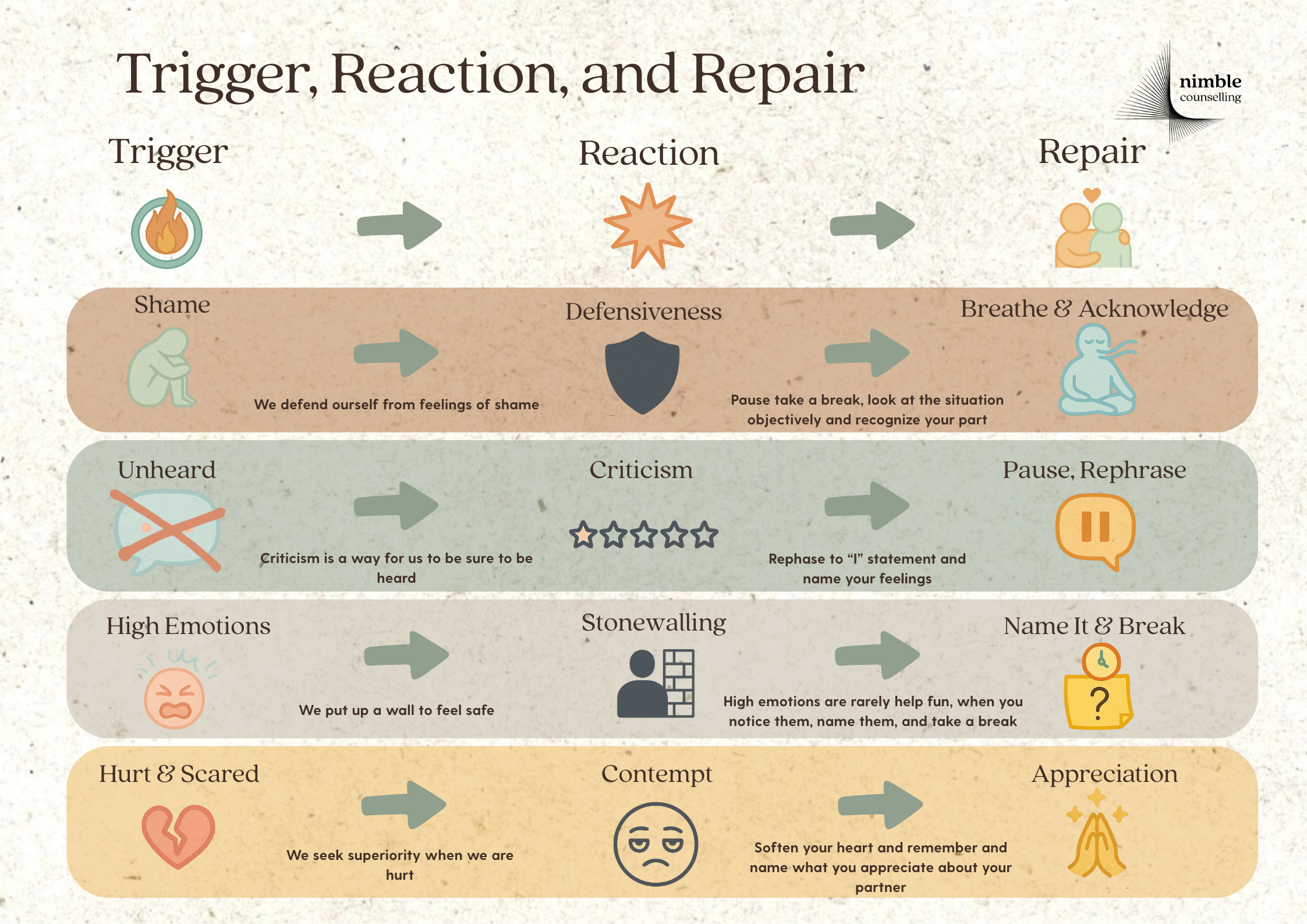Why We Fight: Understanding the Four Horsemen of The Apocalypse (and How to Stop Them)
Nimble Counselling’s Olivia Robillard walks us through Gottman’s Four Horsemen of the Apocalypse, helping us understand why we fight in relationships—and what we can do to stop
Dating in Vancouver isn’t always easy. With nearly half of the city’s adult population identifying as single, Vancouver is often called one of Canada’s loneliest cities—a place where it can feel like everyone’s out living their best life, but no one’s making eye contact.
If you’ve ever caught yourself comparing your quiet Tuesday night to someone else’s highlight reel and wondered why real connection feels so rare, you’re not alone. Sometimes it’s the quiet isolation many of us feel but don’t quite name. Sometimes it’s the pressure to be doing more, to be more. We unpack both in our blog on FOMO in Vancouver and our blog on loneliness in Vancouver.
Let’s be real—most of us don’t walk into relationships thinking, “I can’t wait to criticize, defend, or shut down when things get hard.” We want love. We want connection. We want to feel seen, understood, and safe.
But under stress, even the best intentions can unravel. The way we react—whether it’s pulling away or pushing too hard—can become the very thing that keeps us from the closeness we’re craving.
I’ve seen it in my own relationships.
I’ve seen it in the therapy room.
And maybe, if you’re here reading this, you’ve seen it too.
What Are the Four Horsemen (and Why Should You Care)?
Understanding the Four Horsemen of The Apocalypse helps us break free from them.
The Four Horsemen come from the brilliant minds of Drs. John and Julie Gottman, who studied couples over decades and figured out which communication patterns most predict relationship breakdown.
The names sound dramatic, right? Criticism, Contempt, Defensiveness, Stonewalling.
But when you break them down, they’re heartbreakingly human.
Let me show you.
Criticism: The Sharp Edge of Disappointment
This isn’t just giving feedback.
Criticism is when we make the issue about the other person’s character.
Example:
Instead of: “I feel frustrated you didn’t do the dishes.”
It becomes: “You never help — you’re so lazy!”
I’ve been here. I remember moments where I was tired, overwhelmed, and what slipped out wasn’t a clear need but an attack. And the more I criticized, the more my partner pulled away. Because who feels motivated when they’re being told they’re inherently flawed?
The antidote: Start with “I” statements, express needs clearly, and focus on behaviors — not personality flaws.
Contempt: The Poison We Don’t See Coming
Contempt is the most dangerous of the Four Horsemen. It’s that eye roll, the sarcastic jab, the “Oh, please, you’re such a baby.” It’s speaking from a place of superiority, often when resentment has built up over time.
I once worked with a couple where one partner confessed, “I didn’t even realize how mean I sounded until I heard myself recorded.” Contempt can become so automatic we don’t notice it — but our partners do. It erodes trust and makes reconciliation almost impossible.
The antidote: Build a culture of appreciation. Notice what’s going right, not just what’s wrong.
Defensiveness: The Reflex That Blocks Growth
When we feel accused, our natural response is to defend. “Well, it’s not my fault — you’re the one who’s overreacting!” But defensiveness is rarely productive; it keeps the cycle going.
I know how tempting it is to defend when you feel misunderstood. But I’ve learned (the hard way) that taking even a sliver of responsibility can change the entire tone of the conversation.
The antidote: Pause, breathe, and ask: Is there any part of this I can own? Even a small acknowledgment can soften the dynamic.
Stonewalling: The Disconnection That Hurts
When the emotional overwhelm becomes too much, some of us shut down completely — physically, emotionally, mentally. We retreat, stay silent, leave the room. This is stonewalling.
I’ve sat with clients who say, “I just needed space, but they took it as punishment.”
Or partners who say, “When they shut down, I feel abandoned.”
The truth is, we all need breaks sometimes. But unspoken withdrawal breeds fear and misunderstanding.
The antidote: Practice self-soothing and communicate when you need space. Say, “I’m flooded — I need 20 minutes to calm down, and then I’ll come back.”
Why Do We Fall Into These Patterns in the First Place?
You might be wondering, “If these patterns are so destructive, why do we keep doing them?”
Here’s the honest truth: Most of us didn’t learn how to fight fair. We grew up in families where communication meant raised voices, silent treatments, or walking on eggshells. We may have witnessed hurtful patterns and absorbed them without even realizing.
Or maybe we learned to protect ourselves — not because we’re bad people, but because at some point, these strategies worked.
Criticism feels like a way to be heard.
Contempt feels like a way to feel superior when we’re scared or hurt.
Defensiveness feels like a shield against shame.
Stonewalling feels like the only way to stay safe when emotions run high.
But here’s the key: What protected us in the past might be hurting us now. The good news is that we can unlearn these patterns. Communication isn’t a fixed trait — it’s a skill we can practice, refine, and grow.
So where does that leave us? The answer isn’t perfection — it’s learning to repair and reconnect when these patterns show up.
It’s Not About Perfection — It’s About Repair
Here’s the thing no one tells you:
Even the healthiest couples do the Four Horsemen sometimes.
The difference is that they recognize it, stop, repair, and course-correct.
Repair doesn’t always look like a big dramatic apology. Sometimes it’s:
A gentle touch.
A soft “Hey, I didn’t mean that — can we try again?”
A shared laugh that breaks the tension.
What matters is that you both stay on the same team.
How to Course-Correct in the Moment
Here’s the beautiful thing about recognizing the Four Horsemen:
It’s never too late to notice and pivot.
You don’t have to be perfect. You don’t have to rewind the whole fight.
You just need to course-correct — to steer the conversation back toward connection.
What does that look like?
When you catch yourself criticizing → pause and rephrase.
Instead of “You never listen to me!” try “I’m feeling a bit unheard right now, and I really need your attention.”When you feel contempt creeping in → soften your heart.
Remind yourself of something you appreciate about your partner, even in the moment, and hold onto that as you speak.When you feel defensive → take a breath.
Ask yourself, “Is there any part of this I can own or acknowledge?” Even a small acknowledgment can break the tension.When you’re stonewalling → name it gently.
Say, “I’m starting to feel overwhelmed — can we take a break and come back to this in 20 minutes?”
Course-correcting isn’t about never messing up.
It’s about staying aware, interrupting the cycle, and showing your partner:
I care enough to change direction.
A Challenge for You
Next time you notice one of these patterns in your relationship, try this:
Pause before reacting.
Name what’s happening (“Wow, I’m getting defensive right now.”)
Shift to the antidote.
If you mess up, that’s okay. Growth isn’t linear — it’s a practice.
Building Something New Together
The couples who make it through hard times aren’t the ones who never fight — they’re the ones who know how to repair, reconnect, and rebuild after conflict.
Sometimes that means:
Learning new scripts for tough conversations.
Practicing emotional regulation tools.
Making space for each partner’s experience, even when it’s hard to hear.
Getting support from a trained professional when you feel stuck.
I truly believe every couple can benefit from taking an honest look at their communication patterns and making intentional shifts.
If you’re ready to explore this work together, I’d love to support you.
Book a session with me today — let’s start creating a healthier, more connected dynamic in your relationship.
Nimble Counselling provides professional, inclusive therapy services in Vancouver, both online and in-person. Our downtown Vancouver counselling clinic offers a safe, welcoming space for individuals and couples seeking support with relationships, communication issues, anxiety, trauma, and more. We also offer secure online counselling across British Columbia for those who prefer virtual sessions. Whether you're looking for accessible therapy in Vancouver’s city centre or convenient online counselling from home, our experienced team is here to support your mental health and emotional well-being. Explore our low-cost counselling options and book your first session today.





